52.1.3.4 (52 > 21)
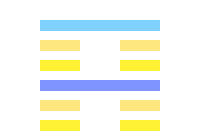
52.1.3.4 (52 > 21) - THE KĂN HEXAGRAM.
- 1. The first line, divided, shows its subject keep- ing his toes at rest. There will be no error; but it will be advantageous for him to be persistently firm and correct.
- 3. The third line, undivided, shows its subject keeping his loins at rest, and separating the ribs (from the body below). The situation is perilous, and the heart glows with suppressed excitement.
- 4. The fourth line, divided, shows its subject keeping his trunk at rest. There will be no error.
52.1.3.4 (52 > 21) - Stop
One listens to one's heart more than one's reason when it comes to protecting one's relatives.
Bing DeepL Google Yandex52.1.3.4 (52 > 21) - Stop
One listens to one's heart more than one's reason when it comes to protecting one's relatives.
Bing DeepL Google Yandex52.1.3.4 (52 > 21) - Kán, l’arrêt
Kán : ferme, tenir droit, bien réglé, arrêter, reposer
-
1. (On doit) tenir fermes ses pieds ; i. e. être toujours d’une ferme droiture.
Ne jamais perdre sa droiture. - 3. Se tenir ferme à sa place et le corps (litt. : les côtes) bien tenu, (c’est ainsi que l’on doit être).
- 4. Tenir le corps droit et ferme, c’est une bonne manière. [On doit tenir le corps entier tout droit.] (Répétition du § 3 pour en avoir six. Tenir le corps droit est un principe essentiel des rites chinois.)
52.1.3.4 (52 > 21) - Cesser
On écoute son cœur plus que sa raison quand il s'agit de protéger ses proches.
Bing DeepL Google Yandex52.1.3.4 (52 > 21) - Megállás
- 1. Nem megy megnézni mit tesznek a többiek hogy kerülje a bajokat.
- 3. A legalkalmasabbat kéri ha mások nem válaszolnak.
- 4. Megáll, de mások folytatják.
The trigrams
The trigrams are combinations of three yin and yang lines. The three bottom lines of the hexagram form the lower trigram and represent the inner situation. The three top lines form the upper trigram and represent the outer situation.
Upper trigram: The mountain The fire


Lower trigram: The mountain The thunder


The formation: 52
What is already there
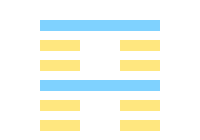
52 - THE KĂN HEXAGRAM.
When one's resting is like that of the back, and he loses all consciousness of self; when he walks in his courtyard, and does not see any (of the persons) in it, there will be no error.
Bing DeepL Google Yandex52 - Stop
One recognizes that it is time to stop because one needs to feed oneself.
Bing DeepL Google Yandex52 - Stop
One recognizes that it is time to stop because one needs to feed oneself.
Bing DeepL Google Yandex52 - Kán, l’arrêt
Kán : ferme, tenir droit, bien réglé, arrêter, reposer
Kan « ferme ». L’homme ferme tourne le dos et s’oppose résolument, sans tenir compte de lui-même. S’il traverse un endroit, il ne regarde pas qui y est et ne faillit point.
Texte
L’homme ferme s’oppose résolument (au mal) sans tenir compte de lui-même. Devant traverser un endroit, il ne regarde pas qui s’y trouve (mais le fait résolument) et ne faillit point.
Symbolisme
Deux montagnes superposées forment le Koua. Ainsi l’homme supérieur pense à ne pas dépasser les bornes de ses fonctions.
Commentaire
Kán signifie s’arrêter, tenir ferme, en bon ordre, agir ou s’arrêter selon l’occasion. Quand l’acte et sa cessation ont lieu en temps convenable, la conduite est belle et intelligente. « Rester à sa place », cela veut dire que les grands et les petits sont en rapport, mais sans usurpation ni entre-croisement. Celui qui est ferme et attentif à son devoir ne se recherche pas lui-même. Marchant dans son jardin, il ne voit pas même qui s’y trouve.
Note. Tout ceci illustre le sens « tenir droit, bien réglé » et se réfère aux rites du maintien extérieur qui prescrivent de se tenir toujours droit et de ne pas même s’asseoir sur un siège qui n’est pas droit.
52 - Cesser
On reconnaît qu'il est temps de s'arrêter car on a besoin de s'alimenter.
Bing DeepL Google Yandex52 - Megállás
Felismeri hogy itt az ideje megállni mert a többieket táplálni kell.
Bing DeepL Google Yandex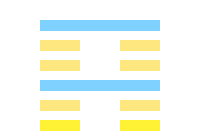
52.1 (52 > 22) - THE KĂN HEXAGRAM.
The first line, divided, shows its subject keep- ing his toes at rest. There will be no error; but it will be advantageous for him to be persistently firm and correct.
Bing DeepL Google Yandex52.1 (52 > 22) - Dropping one's probe
One is not going to see what others are doing, to avoid trouble.
Bing DeepL Google Yandex52.1 (52 > 22) - Dropping one's probe
One is not going to see what others are doing, to avoid trouble.
Bing DeepL Google Yandex52.1 (52 > 22) - Kán, l’arrêt
Kán : ferme, tenir droit, bien réglé, arrêter, reposer
(On doit) tenir fermes ses pieds ; i. e. être toujours d’une ferme droiture.
Ne jamais perdre sa droiture.
52.1 (52 > 22) - Renoncer à son enquête
On ne va pas voir ce que font les autres, pour éviter les ennuis.
Bing DeepL Google Yandex52.1 (52 > 22) - Megállás
Nem megy megnézni mit tesznek a többiek hogy kerülje a bajokat.
Bing DeepL Google Yandex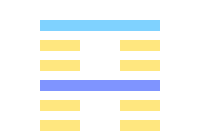
52.3 (52 > 23) - THE KĂN HEXAGRAM.
The third line, undivided, shows its subject keeping his loins at rest, and separating the ribs (from the body below). The situation is perilous, and the heart glows with suppressed excitement.
Bing DeepL Google Yandex52.3 (52 > 23) - Losing blood
One asks the most capable when others don't answer.
Bing DeepL Google Yandex52.3 (52 > 23) - Losing blood
One asks the most capable when others don't answer.
Bing DeepL Google Yandex52.3 (52 > 23) - Kán, l’arrêt
Kán : ferme, tenir droit, bien réglé, arrêter, reposer
Se tenir ferme à sa place et le corps (litt. : les côtes) bien tenu, (c’est ainsi que l’on doit être).
Bing DeepL Google Yandex52.3 (52 > 23) - Perdre son sang
On demande aux plus capables quand les autres ne répondent pas.
Bing DeepL Google Yandex52.3 (52 > 23) - Megállás
A legalkalmasabbat kéri ha mások nem válaszolnak.
Bing DeepL Google Yandex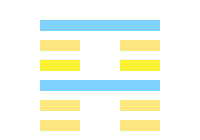
52.4 (52 > 56) - THE KĂN HEXAGRAM.
The fourth line, divided, shows its subject keeping his trunk at rest. There will be no error.
Bing DeepL Google Yandex52.4 (52 > 56) - Kán, l’arrêt
Kán : ferme, tenir droit, bien réglé, arrêter, reposer
Tenir le corps droit et ferme, c’est une bonne manière. [On doit tenir le corps entier tout droit.] (Répétition du § 3 pour en avoir six. Tenir le corps droit est un principe essentiel des rites chinois.)
Bing DeepL Google YandexIn the making: 21
What is poised to happen
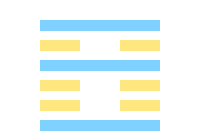
21 - THE SHIH HO HEXAGRAM.
Shih Ho indicates successful progress (in the condition of things which it supposes). It will be advantageous to use legal constraints.
Bing DeepL Google Yandex21 - Shih hok, mordre au travers
Shih hok : 1. Bavardage mordant, méchant ; 2. Hok : mordre, mâcher.
Texte
Si ce parler méchant se développe, il produira querelles et procès.
Symbolisme
Tonnerre et éclair forment le troua. Les anciens rois, en montrant les châtiments, établissaient fermement les lois. Le fort et le faible ayant leurs places distinctes et agissant avec intelligence, c’est le tonnerre et l’éclair unis et brillant ensemble. Le faible est en dessous et agit vers le haut.
Commentaire
Shih « mordre » veut dire qu’on a quelque chose entre les dents.
21 - Juger
On voudrait se réunir mais on doit respecter le choix des autres.
Bing DeepL Google Yandex21 - Döntés
Szeretne személyesen találkozni de be kell érnie képviselőkkel.
Bing DeepL Google YandexThe nuclear hexagram: 40.2.3.4.5 (40 > 39)
The nuclear hexagram is the association of the two inner trigrams (lines 2,3,4 and 3,4,5). It represents the root, or the origin of the situation.
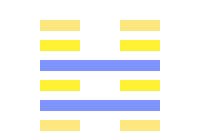
40.2.3.4.5 (40 > 39) - THE KIEH HEXAGRAM.
- 2. The second line, undivided, shows its subject catch, in hunting, three foxes, and obtain the yellow ( = golden) arrows. With firm correctness there will be good fortune.
- 3. The third line, divided, shows a porter with his burden, (yet) riding in a carriage. He will (only) tempt robbers to attack him. However firm and correct he may (try to) be, there will be cause for regret.
- 4. (To the subject of) the fourth line, undivided, (it is said), ‘Remove your toes. Friends will (then) come, between you and whom there will be mutual confidence.’
- 5. The fifth line, divided, shows (its subject), the superior man ( = the ruler), executing his function of removing (whatever is injurious to the idea of the hexagram), in which case there will be good fortune, and confidence in him will be shown even by the small men.
40.2.3.4.5 (40 > 39) - Complying with the established rule
One refuses to satisfy unusual requests.
Bing DeepL Google Yandex40.2.3.4.5 (40 > 39) - Complying with the established rule
One refuses to satisfy unusual requests.
Bing DeepL Google Yandex40.2.3.4.5 (40 > 39) - Kieh, la libération
Kieh : 1. Délivrer, faire échapper, échapper au danger ; 2. Disperser ; 3. Ouvrir, séparer, s’ouvrir. Se dit du mouvement de la germination. 4. Résoudre une difficulté, une complication.
- 2. Délivrer est aussi heureux que, pour le chasseur, prendre trois renards et obtenir le prix, la flèche d’or. — Celui qui résout une difficulté, fait sortir d’une position difficile, est comme le chasseur qui prend trois renards et obtient la flèche d’or.
-
3. Si un porteur se met dans un char et qu’il survienne des voleurs, il sera attaqué et échappera difficilement ; s’il abandonne sa charge, il pourra se sauver.
Pour un porteur, aller en char est honteux ; c’est attirer sur soi les voleurs.
Il n’appartient pas à des gens du commun d’aller en char . -
4. Échappez d’abord et après cela les amis viendront témoigner leur fidélité (sinon ils vous abandonnent).
Note. Le mot qui signifie ordinairement gros orteil est expliqué par les commentateurs comme ayant ici le sens de tchū, commencement, d’abord - 5. C’est au sage d’écarter (les maux) et de résoudre (les difficultés) ; s’il y réussit, il gagnera la confiance du vulgaire.
40.2.3.4.5 (40 > 39) - Se conformer à la règle établie
On refuse de satisfaire des demandes inhabituelles.
Bing DeepL Google Yandex40.2.3.4.5 (40 > 39) - Módosítás
- 2. Megkérik hogy válaszokat keressen mielőtt túl késő.
- 3. Ha valaki elhanyagolja, másoknak adja.
- 4. Ajtók fognak megnyílni ha valaki felhagy a felesleges kényelemkereséssel.
- 5. Csak egy alkalmas személy tudja megmutatni a megoldást.
Ruler
The starting situation

52.4 (52 > 56) - THE KĂN HEXAGRAM.
The fourth line, divided, shows its subject keeping his trunk at rest. There will be no error.
Bing DeepL Google Yandex52.4 (52 > 56) - Kán, l’arrêt
Kán : ferme, tenir droit, bien réglé, arrêter, reposer
Tenir le corps droit et ferme, c’est une bonne manière. [On doit tenir le corps entier tout droit.] (Répétition du § 3 pour en avoir six. Tenir le corps droit est un principe essentiel des rites chinois.)
Bing DeepL Google YandexCorrection
The direction where the ruler is going to bend
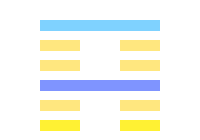
52.1.3 (52 > 27) - THE KĂN HEXAGRAM.
- 1. The first line, divided, shows its subject keep- ing his toes at rest. There will be no error; but it will be advantageous for him to be persistently firm and correct.
- 3. The third line, undivided, shows its subject keeping his loins at rest, and separating the ribs (from the body below). The situation is perilous, and the heart glows with suppressed excitement.
52.1.3 (52 > 27) - Stop
One has returned most of the items one borrowed, but some are missing.
Bing DeepL Google Yandex52.1.3 (52 > 27) - Stop
One has returned most of the items one borrowed, but some are missing.
Bing DeepL Google Yandex52.1.3 (52 > 27) - Kán, l’arrêt
Kán : ferme, tenir droit, bien réglé, arrêter, reposer
-
1. (On doit) tenir fermes ses pieds ; i. e. être toujours d’une ferme droiture.
Ne jamais perdre sa droiture. - 3. Se tenir ferme à sa place et le corps (litt. : les côtes) bien tenu, (c’est ainsi que l’on doit être).
52.1.3 (52 > 27) - Cesser
On a restitué la plupart des objets que l'on avait emprunté mais certains manquent à l'appel.
Bing DeepL Google Yandex52.1.3 (52 > 27) - Megállás
- 1. Nem megy megnézni mit tesznek a többiek hogy kerülje a bajokat.
- 3. A legalkalmasabbat kéri ha mások nem válaszolnak.

